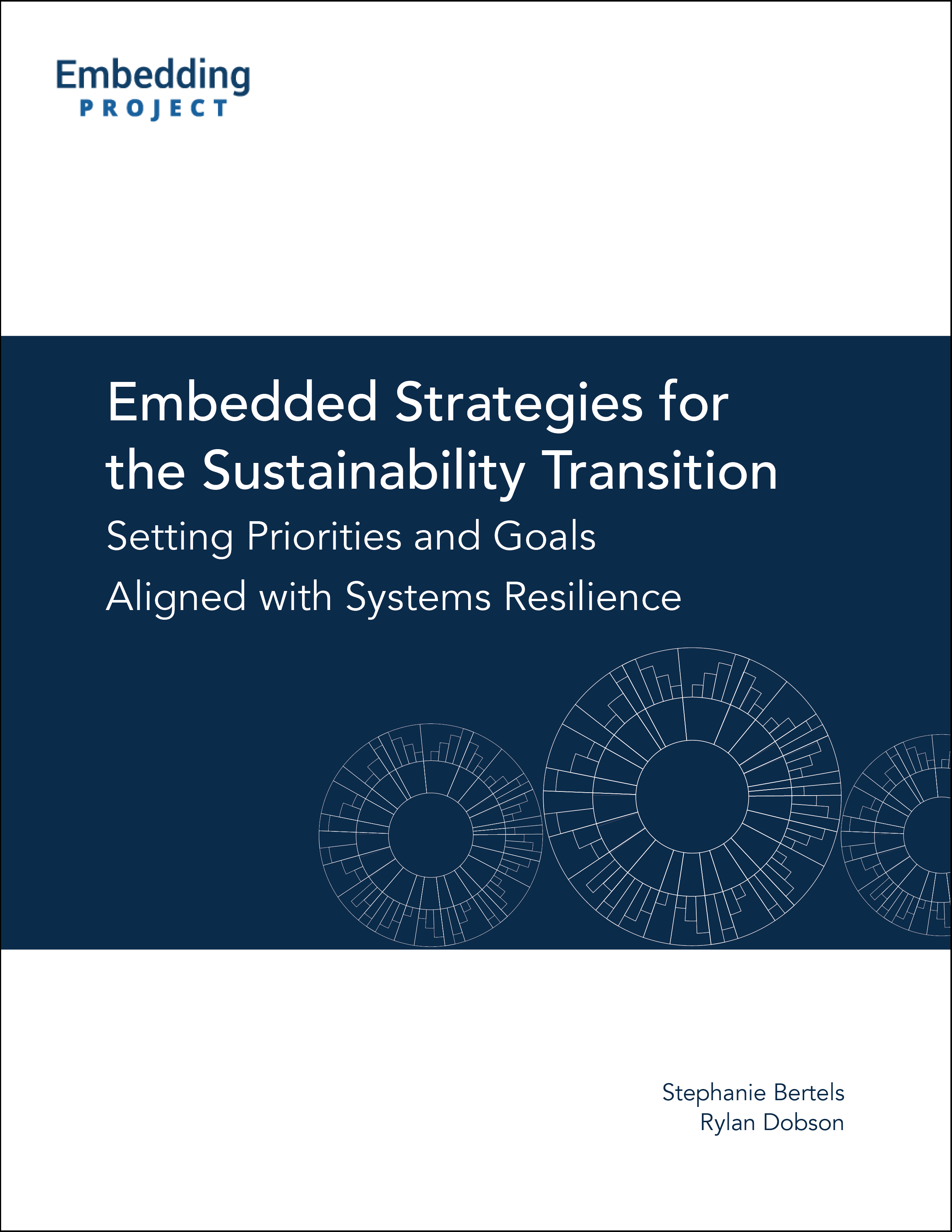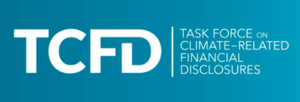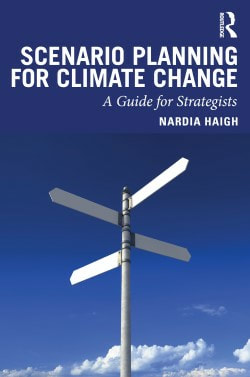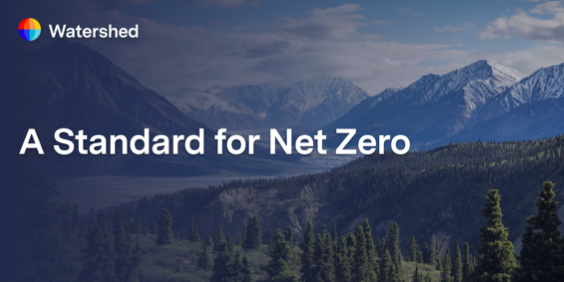Raise the Bar
Description
These resources will help you to adhere to and contribute to the ongoing development of external industry and multi-sector standards, frameworks, certifications, voluntary codes of conduct, and oversight mechanisms related to social and/or environmental performance.
Share this Practice on:LinkedIn
Resources
Understanding Corporate Sustainability
Getting Started Guides: An Introduction
Whether you are developing your first strategy for sustainability or refining an existing one, our Getting Started Guides can help provide clarity on the work ahead. Getting Started Guides: An Introduction shares our overall approach and clarifies the value of setting a clear strategy anchored in your company’s most material issues. It also explains key concepts that underpin the work outlined within each guide, including building an understanding of system thresholds and process-based interim targets.
You can also find each of our issue-specific Getting Started Guides below.
Embedded Strategies for the Sustainability Transition
It is time for companies to take a very different approach to corporate strategy.
Our Embedded Strategies guide helps companies respond to the growing calls for businesses to articulate their purpose and their strategy in alignment with the need to shift the global economy towards the reduction of inequality, a rapid climate transition, the preservation of biodiversity, and the elimination of waste.
This guide will help you to develop a contextual strategy and goals that ensure your company is doing its part to maintain the resilience of key social and environmental systems.
Building on our Road to Context guide with insights from 300+ interviews with senior executives, CEOs, board chairs, and directors, as well as our experiences supporting companies around the world, it outlines resources and tactics that can help your company to scan for emerging issues and risks; understand their implications for your business; understand your impacts and your potential for positive influence; prioritise where it makes sense to direct your efforts; and set your strategy and goals in alignment with delivering systems value.
ENCORE (Exploring Natural Capital Opportunities, Risks, and Exposure)
ENCORE (Exploring Natural Capital Opportunities, Risks, and Exposure), a free tool from the Natural Capital Finance Alliance, can help you to visualise how your business may be exposed to accelerating environmental change. The tool provides a snapshot of the dependencies and impacts for a wide range of sub-industries and processes, and includes fact sheets and maps to help you understand the links between business activities and nature.
IFRS Sustainability Disclosure Standards
The IFRS Foundation is a not-for-profit responsible for developing global accounting and sustainability disclosure standards, known as the IFRS Standards. The International Sustainability Standards Board (ISSB) is an independent standard-setting body within the IFRS Foundation, and they have created a framework for the global business community to disclose material information on sustainability and exposure to climate-related risks and opportunities. This will help ensure that companies are providing consistent and comparable sustainability-related information alongside financial statements, in the same reporting package.
IFRS S1 provides a set of general reporting requirements for disclosing sustainability-related risks over the short, medium, and long term. IFRS S2 sets out specific climate-related disclosures, including the impact that climate change will have on an entity’s financial position, performance, cash flows, strategy, and business model. IFRS S2 is designed to be used with IFRS S1, and both of these standards fully incorporate the recommendations of the Task Force on Climate-related Financial Disclosures (TCFD).
The Task Force on Climate-related Financial Disclosures
Momentum is growing for organisations to formally and transparently articulate the risks that climate change poses to the value of their assets and their future profitability. The Task Force on Climate-related Financial Disclosures (TCFD) emerged as a response to this call for action, empowering companies to more effectively measure and evaluate their own risks and those of their suppliers and competitors. The TCFD promoted “consistent, comparable, reliable, clear, and efficient” voluntary climate-related financial disclosures, and has developed comprehensive recommendations and resources in support of this. These resources focus on governance, strategy, risk, metrics, targets, and the use of scenario analysis for evaluating climate-related financial risks and opportunities.
The TCFD has produced a comprehensive Final Recommendations report and several supplemental reports, including a Technical supplement, which provides in-depth information and tools for using scenario analyses to understand the strategic implications of climate-related risks and opportunities to your organisation.
Although these resources remain to be an invaluable source of guidance, the Financial Stability Board (FSB) and IFRS have announced that the TCFD has fulfilled its remit and disbanded, and that monitoring of the progress of corporate climate-related disclosures now rests with the IFRS Foundation's ISSB.
The Taskforce on Nature-related Financial Disclosures
Reversing global nature loss depends on a shift in global financial flows away from nature-negative outcomes and toward nature-positive outcomes. This depends on large and small businesses across supply chains, financial institutions, and industries of all types collectively identifying, assessing, managing, and disclosing nature-related dependencies, impacts, risks, and opportunities. Towards meeting this inter-industrial challenge, the Taskforce on Nature-related Financial Disclosures (TNFD) was established in 2021 in response to the growing need to factor nature into financial and business decisions.
The TNFD has developed a market-led, science-based risk management and disclosure framework for organisations to report and act on evolving nature-related risks and opportunities. The TNFD has also developed case studies and sector-specific guidance; a Knowledge Hub that features a curated collection of the latest external resources and market insights on nature-related risks and opportunities; and an open-access Learning Lab that supports self-paced learning about nature-related issues, the TNFD recommendations, and additional guidance.
The Task Force for Corporate Action Transparency (TCAT)
The Task Force for Corporate Action Transparency (TCAT) is a new initiative dedicated to strengthening the credibility of corporate climate action through transparent, verified, and third-party assurable accounting and reporting guidance. Until now, companies have been able to report numerical emissions data through frameworks like the Greenhouse Gas (GHG) Protocol or set reduction targets through initiatives like the Science Based Targets initiative. However, these frameworks lack standardised methods for companies to report the specific actions behind those reductions (e.g. transport companies replacing diesel trucks with electric vehicles, manufacturers capturing and storing carbon dioxide in underground reservoirs, etc). TCAT intends to develop, publish, and promote technical guidance and methodologies that help companies report emissions reduction and removal efforts transparently and clearly, and address gaps in financial and GHG accounting, reporting, and assurance by developing and aligning with best-in-class standards and practices
TCAT has launched two comprehensive GHG reporting frameworks. Developed through a collaboration among environmental groups, accounting experts, NGOs, business practitioners, and civil society members, the guides are designed to help companies explain exactly how they are lowering their emissions in real time, and in a way that is comparable across industries and verifiable by third parties. These guides are designed to fill an important gap in how companies measure, report on, and verify their corporate climate actions.
The first framework is Mitigation Action Accounting and Reporting Guidance (MAARG), which equips companies with tools to account transparently for the full spectrum of ton-denominated climate actions. Its multi-statement approach enables companies to report on climate actions without conflating different types of activities; MAARG’s framework allows each action to be clearly categorised and measured. Rather than consolidating all GHG-related activities into a single statement, which can obscure the distinction between actual emission reductions and accounting-only or business changes, MAARG introduces a five-statement reporting framework which supports both inventory and impact accounting: physical inventory statement, contractual inventory statement, inventory impact mitigation statement, sector impact mitigation statement, and global impact mitigation statement.
TCAT’s second new framework is the Target Accounting and Reporting Guidance (TARG), which provides structured guidance for setting voluntary climate targets, tracking progress, and communicating results. This standardised approach enables stakeholders to assess the credibility and ambition of corporate climate targets and evaluate actual performance against commitments. In the absence of a unified framework in the voluntary reporting space, TARG fills a critical gap by offering clear and consistent methods for companies to disclose climate targets and report progress in a transparent and assurable manner. The framework is built around five core reporting elements: a target commitment report, base year emissions report, mitigation action report, target accounting report, and target attainment report.
5 Steps to a Corporate Strategy That Delivers on Sustainability
To achieve the societal transformation we need, companies must do their part to embed sustainability into their core strategy. That means focusing on more than shareholder value or even stakeholder value… it means focusing on systems value. We've created a straight-forward five-step process to help companies develop a truly embedded strategy.
Defining True Sustainability
In this brief article, Cory Searcy suggests that companies must change how they view sustainability if they want to determine whether or not they are sustainable. He explains how most companies currently focus on reducing environmentally destructive or unethical behavior, and how they must instead assess their performance relative to thresholds linked to the economic, environmental, and social resources on which they rely. This is a great, quick read that will help you articulate the need for moving beyond the 'triple bottom line' and towards a context-based 'embedded view'.
Scenario Planning for Climate Change: A Guide for Strategists
This book from Nardia Haigh takes a deep dive into climate change-related scenario planning and provides a framework that can help decision-makers develop a climate change strategy. The book builds on a range of rigorously tested scenario planning frameworks and provides a practical, four-step method for developing a scenario planning project. It also includes summaries of common climate change trends.
Her website also offers complementary videos, climate driver summaries, a sample scenario planning project proposal, and various worksheets to help you get started.
Strategic Foresight Primer
This introductory guide on strategic foresight is a good, accessible primer for board members, executives, and other business leaders who want to grow their understanding of and capacity for long-term scanning and planning. It explains what foresight is, what it is not, and what it can achieve. It also provides an overview of some of the most common methods and tools for effective strategic foresight.
Foresight Training Modules
These Foresight Training Modules were created by Policy Horizons Canada to help users build a better understanding of foresight-related methodologies. The modules cover topics such as scanning, assumptions, and systems mapping, and they feature summaries, exercises, tip sheets, and even presentation and facilitation notes to support change agents in teaching this material to peers and leaders.
Although policymakers in government were the target audience for these modules, the content is equally applicable to educators and decision-makers in business.
Equitable Futures Toolkit
This toolkit aims to help you imagine a more equitable future through two different interactive approaches: through Institute For The Future (IFTF) Foresight Training and the Equitable Futures Card Game. These modular workshops would especially benefit sustainability practitioners who want to facilitate sessions with senior leaders. The tools included provide a novel way of helping participants to understand the factors impacting your business; to create meaningful social narratives that can guide strategy; to build awareness of the positive and negative consequences that your business has on the world around it; to develop an understanding of challenges to overcome and the values and tools needed to build a more equitable future; and more.
The Futures Toolkit: Tools for Futures Thinking and Foresight Across UK Government
This toolkit was created by the UK's Government Office for Science to help acquaint policymakers and government officials with foresight and futures thinking and to help with the creation of scenarios. We specifically recommend pages 26-76, which highlight a broad range of tools that can help you to gather intelligence about the future; explore the dynamics of change; describe potential futures; and develop and test policies and strategy.
Sustainable Development Goals Interactive Tool
IISD has developed a free interactive tool that directs users to SDG-related publications by region or goal. This tool provides insight into how the SDGs impact companies and communities around the world, and may be of particular use for companies with an international scope or those interested in entering new markets.
CISL’s Business Transformation Framework: Preliminary Diagnostic
This tool from the Cambridge Institute for Sustainability Leadership (CISL) can help you better understand how purpose-driven your business is. The Business Transformation Framework groups businesses into progressive categories: short-term self-interest; long-term self-interest (developing); long-term self-interest (mature); and purpose-driven. The self-reflective diagnostic tool can help you place your business along this continuum, as per an assessment indicators that includes organisational values, senior leadership, and financial management. This resource will be most useful to business leaders, change managers, and sustainability professionals seeking to drive business transformation.
The Ceres Roadmap 360º
This assessment tool from Ceres was designed to help small- and medium-sized companies assess and improve their sustainability performance. The tool features free, user-friendly, self-guided learning modules on management, engagement, and sustainability issues; additional modules can be unlocked with a premium account. The tool also produces customised reports that include a scorecard, best practice recommendations, and useful resources that can help you to embed sustainability into your strategic planning processes, governance systems, and decision-making.
Global Leadership in the Age of Turbulence
This report can help you understand the leadership challenge of our time—that is, the scale and complexity of “preserving human civilization." The report summarises the main insights from the 2024 Global Leadership Summit, including discussions of major trends related to geopolitics, innovation, governance, and economics. It then provides recommendations for leaders to enable a societal transition, which include accelerating innovation and the deployment of proven technologies; advocating for a new economic system that prioritises the social and environmental foundations that society is built on; and engaging citizens by repairing trust in political and corporate-level decision-making. These insights encourage a wider view of context and a longer view of history, which will be especially useful to business leaders.
The Global Regulations Radar: Bi-Annual Update on ESG and EHS Regulations
This bi-annual radar tool from the ERM Sustainability Institute can help you stay up-to-date on the sustainability regulations landscape. The radar provides an overview of ESG and EHS regulation in Europe, North America, and the Asia-Pacific region. It includes new regulatory developments and upcoming changes in each region and features an ESG and EHS regulations matrix, which lists the regulations that are expected to have the greatest impacts on companies with global operations. For each regulation, the matrix provides the rule highlights, scope, business context, timeline, and applicability. This tool will be most useful to your sustainability, legal, and compliance teams.
A Review of the Link Between Sustainability Performance and Company Valuation
This brief from WBCSD can help you to understand how capital markets are starting to reflect sustainability performance in company valuations; the benefits of strong, credible sustainability performance; and the risks of delaying action. It provides insights into the short-term and long-term impacts - including benefits and potential costs - of sustainability initiatives; the risks of the "do-nothing" option; evidence of how sustainability performance influences company valuation and financing conditions; and practical guidance for integrating sustainability into financial and strategy decision-making. The report explains that although initial costs will be required (and will need to be justified), financial markets increasingly reward robust environmentally sustainable practices with higher valuations, lower capital costs, and more investment. It also notes that, overall, more recent studies and surveys suggest that sustainable business strategies enhance corporate resilience and open new financial opportunities.
Other Resources
About Sustainability Reporting: The GRI Standards
Developed in 1997, the GRI Sustainability Reporting Standards (GRI Standards) became the first and most widely used global standards for sustainability reporting. Today, over 12,000 companies use GRI Guidelines for sustainability reports, and they continue to serve as a credible global industry standard. This link introduces the global best practices for reporting publicly on universal standards. It also dives into a range of more specific topics related to social, environmental, and economic impacts.
ISEAL Alliance
How can you know which sustainability standards are credible? ISEAL is the global membership organisation for collaborative and transparent sustainability systems. Its members include Fairtrade International, Bonscuro, Forest Stewardship Council, and Rainforest Alliance, among others. ISEAL’s Community Members are sustainability standards and similar systems that collaborate to scale and demonstrate positive impact. Its Code Compliant members go further, adhering to ISEAL’s Codes of Good Practice – a globally recognised framework for best practice. It also releases tools and resources such as its Sustainability Claims Good Practice Guide and Challenge the Label, a guide for buyers when evaluating product sustainability claims.
The Net-Zero Standard
The Science Based Targets initiative’s (SBTi) Corporate Net-Zero Standard includes the guidance, criteria, and recommendations companies need to set science-based net-zero targets consistent with limiting global temperature rise to 1.5°C. The framework consists of four parts: 1) setting near-term interim science-based targets for rapid, deep emissions cuts, 2) setting long-term science-based targets that align with reaching net-zero at the global or sector level by 2050 or sooner, 3) neutralising residual emissions, and 4) taking action to mitigate emissions beyond the value chain. This resource also includes specific sector guidance for setting science based targets, as well as guidance for updating and communicating targets. It should be noted that SBTi has reduced their restrictions related to acceptable carbon removal practices, including offsetting, but the document highlights that only the final 5-10% of emissions may be neutralized this way in order to qualify as net-zero. It should also be noted that SBTi is now undertaking a major revision, which will result in V2.0 of the Corporate Net-Zero Standard. Until then, businesses seeking to set SBTi-aligned net-zero targets should use the current Corporate Net-Zero Standard V1.2.
A Standard for Net Zero
A wave of companies are committing to “net zero," but what does being a net zero business mean in practice? The Science Based Targets initiative has released their definition and framework for reaching net zero, and it includes allowances for up to 10% of a company's emissions profile to be removed as offsets. If you are looking for clear and appropriate criteria for "net zero" best practices that will advance you beyond this, this resource from Watershed explains how net zero differentiates from "carbon neutral" and will help you to understand the actions that are required for your company to become a genuine "net zero company."
A Business Reference Guide: United Nations Declaration on the Rights of Indigenous Peoples
Indigenous peoples have a unique and important place in the global community, and yet so many industries and organisations continue to struggle with positive and respectful engagement and co-creating mutually-beneficial business agreements. The guide is non-prescriptive, and offers insights, examples, and suggestions for a diverse range of issues and contexts that can help you to engage in meaningful and effective consultation and partnership with Indigenous Peoples on a local level, and to adapt the principles and practices for distinct situations.
Part I explores specific business actions, such as free, prior and informed consent and grievance mechanisms, and Part II explores the UN Declaration Rights in detail, such as those related to culture, language, land, and natural resources, with suggested practical actions and examples.
The CSRD: A guide for companies
The CSRD is intended to bring sustainability reporting up to the same quality and control bar as financial reporting, and companies will need to elevate the breadth and robustness of their ESG reporting to comply with these new regulations. Watershed has created this short guide to help you to better understand the CSRD’s technical rules, also known as the European Sustainability Reporting Standards. These rules include topics such as general disclosures, social and environmental standards, and governance standards. It also unpacks how the CSRD define "double materiality" and outlines timeframes and other CSRD reporting expectations.
Ten things to know about the first ISSB Standards
This article from the IFRS can help you understand what the new ISSB standards are about. The inaugural IFRS Sustainability Disclosure Standards were issued to provide a global baseline of sustainability-related disclosures for the capital markets. IFRS S1 requires companies to communicate the sustainability-related risks and opportunities they face over the short, medium, and long term, and IFRS S2 sets out specific climate-related disclosures and is designed to be used with IFRS S1. This article provides a useful overview for Sustainability and Finance teams that will be making use of the new standards in their corporate reporting.
Implementation Guidance for the International Sustainability Standards Board (ISSB) Standards and the European Sustainability Reporting Standards (ESRS)
This guidance from the WBCSD CFO Network can help you to better meet modern sustainability reporting requirements and respond more credibly to requests for sustainability performance information from investors, banks and regulators. It provides a side-by-side analysis of two new sustainability disclosure standards: the IFRS standard from the International Sustainability Standards Board (ISSB) and the European Sustainability Reporting Standard. It explains how to set up reporting; identifies what needs to be reported; explains how to ensure credible disclosures; and more. This guidance may be especially useful to CFOs and finance teams.
IWA 48:2024: Framework for implementing environmental, social and governance (ESG) principles
This set of ESG implementation principles from ISO can help you to better navigate the complex landscape of environmental, social, and governance expectations and to implement and embed ESG practices within your organisation. Developed through a collaborative cohort that includes the British Standards Institution (BSI), the Standards Council of Canada (SCC), and the Brazilian Association of Technical Standards (ABNT), the principles incorporate input from over 1,900 industry experts across 128 countries. They provide a high-level structure for integrating existing ESG requirements; establishing measurable and comparable key performance indicators; assessing maturity in ESG practices; and facilitating consistent, comparable, and reliable ESG reporting.
Not Fit-for-Purpose: The Grand Experiment of Multi-Stakeholder Initiatives in Corporate Accountability, Human Rights and Global Governance
Multi-Stakeholder Initiatives (MSIs) play an important role in engaging corporations, building trust and relationships, and sharing knowledge, but is it appropriate for MSIs to protect human rights, detect abuses, and hold corporations accountable? This report from MSI Integrity studies the effectiveness and impacts of forty standard-setting MSIs in upholding and protecting human rights. It researches all elements of how MSIs operate and provides key insights into topics including stakeholder participation; standards and scope; monitoring and compliance; and impact. This report can help you to apply a critical lens to the limitations of voluntary regulation and to envision more effective strategies for protecting human rights.
Standards Map
This comprehensive database from the International Trade Centre (ITC) provides free, accessible, verified, and transparent information on over 300 standards related to a wide range of sustainability topics, including worker rights, environmental protection, and business ethics. ITC also provides a Standards Map toolkit, which will help you to find information about voluntary sustainability standards, codes of conduct, audit protocols, reporting frameworks, and company programs on sustainability.
Share this Practice on:LinkedIn




























